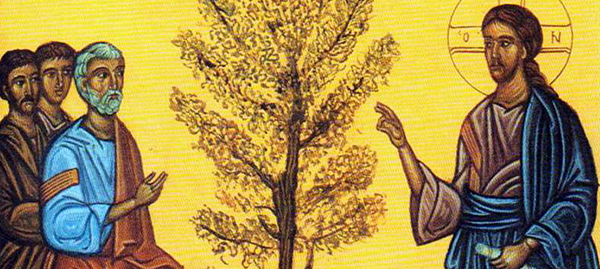
V/ I will turn to you O God,
R/ to God who gives joy to my youth
V/ Give me the Wisdom that sits by your throne;
R/ that I may be counted among your children
Lord, in your all-providential plan, you have led me to this moment to rediscover me in your Word and Wisdom. Aid me to make this time of meditation and prayer enriching, transforming, and liberating for my well-being and others. Amen!
FAITH IN A TROUBLED WORLD
By Dr. Emmanuel Johnson Ibuot
27th Sunday in Ordinary Time, Year C
Habakkuk 1:2-3,2:2-4; Psalm 95(94): 1-9; 2 Timothy 1:6-8,13-14; Luke 17: 5-10
5th October 2025
The cry of the prophet Habakkuk echoes through the centuries, a raw and honest lament that resonates deeply in the heart of anyone who has looked upon the world and asked, “O Lord, how long shall I cry for help, and you will not hear?” This question, born of anguish in the face of violence, injustice, and strife, is not a sign of faithlessness. On the contrary, it is the starting point of a profound and wrestling faith, one that refuses to accept easy answers and dares to bring its deepest frustrations before God. Habakkuk’s complaint is a powerful validation of our own moments of doubt and despair when the wicked seem to prosper and righteousness appears to be a fool’s errand.
The Lord’s response to Habakkuk is not an immediate resolution but a call to a different way of seeing and being. “Write the vision; make it plain,” God commands, promising that this vision of truth will surely come and expose the instability of unrighteousness. In a world that prizes instant gratification, this is a difficult lesson. We are called to live in the “meantime,” holding onto a promise that is not yet fully realised. The crux of this existence is found in the powerful declaration: “the righteous shall live by his faith[fulness].” This is not a passive waiting but an active, moment-by-moment choice to trust in God’s ultimate justice. It is a stand against the instability of a deceitful world, recognising that unaided human nature, leaning on the “arm of the flesh,” can only guarantee failure.
This theme of divine justice is amplified in Psalm 94, which begins with a fervent plea: “O Lord, God of vengeance, shine forth!” The psalmist, like Habakkuk, is bewildered by the arrogance of the wicked yet beneath the anger is a foundational trust in God’s character. In his letter to Timothy, Paul shifts the focus from the external world to the internal life of the believer. He urges his young protégé to “stir into flame the gift of God that you have.” This highlights the two dimensions of faith: our human responsibility to cultivate it, and the divine power required for it to thrive. Faith is not a static possession but a living fire that requires tending.
This concept of faith is brought into sharp focus in Luke’s Gospel. When the apostles plead, “Increase our faith!”, Jesus’ reply is startling. His answer suggests their prayer itself was misplaced. He doesn’t offer them a larger quantity of faith but speaks of its very essence, implying they needed not an increment, but an inception. “If you have faith the size of a mustard seed,” He explains, you could command a mulberry tree to be uprooted. The issue is not the amount of faith we possess, but whether we possess any true faith at all—a radical trust in God’s power rather than our own, proven not by feelings but by “kingdom business” like preaching, healing, and witnessing.
He immediately follows this with the parable of the unworthy servant, a story that reorients our entire understanding of service. The servant who does his duty is not owed special thanks; he has simply done what was required. In our relationship with God, faith is not a currency we use to purchase blessings. It is the very posture of our existence. To cultivate it requires a disciplined, personal spiritual culture of prayer and study, as exemplified by the Carmelite tradition. It means moving beyond a reliance on communal prayers as a substitute for a personal relationship. We serve not to gain God’s favour, but because we already have it. We live by faith, fulfilling our duty, and at the end of the day, we can only say, “We are unworthy servants; we have only done what was our duty.” In this humble admission lies the secret to a faith that can withstand the silence, wait for the vision, and, like a mustard seed, hold the power to move mountains.
Daily Offering
Lord, I offer myself to you anew, in scaling the heights of Carmel by taking to heart your Word and Wisdom communicated through this time of meditation. May I be transformed into a prayer presence in the World. Amen
Questions for reflection:
• In what areas of your own life or concerning the world’s injustices do you feel this same frustration as Habakkuk’s?
• How can you reframe these moments as an invitation to engage more honestly with God, rather than as a failure of your faith?
• How are you actively cultivating the seed of true faith you already have through a “personal spiritual culture” of prayer, study, and service?
• In what ways might you view your good deeds or religious practices as a way to put God in your debt? How can you shift your mindset to one of humble duty, finding freedom in simply saying, “I have only done what was my duty”?
Suggested Exercise for the Week:
Explore the call to “live by faith” in the “meantime,” where are you most impatient for God’s intervention or answers. And practice an active, moment-by-moment trust in God’s ultimate justice.
Commit to Heart: I have only done what was my duty.
